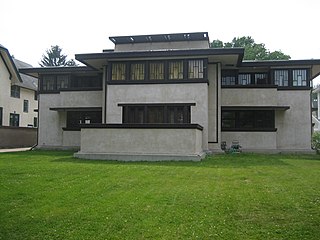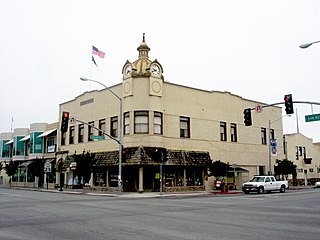
The Crossroads is a neighborhood within Greater Downtown with a population of 7,491. It is centered at approximately 19th Street and Baltimore Avenue, directly south of the Downtown Loop and north of Crown Center. It is the city's main art gallery district and center for the visual arts. Dozens of galleries are located in its renovated warehouses and industrial buildings. It is also home to numerous restaurants, housewares shops, architects, designers, an advertising agency, and other visual artists. The district also has several live music venues.

The Jefferson Market Branch of the New York Public Library, once known as the Jefferson Market Courthouse, is a National Historic Landmark located at 425 Avenue of the Americas, on the southwest corner of West 10th Street, in Greenwich Village, Manhattan, New York City, on a triangular plot formed by Greenwich Avenue and West 10th Street. It was originally built as the Third Judicial District Courthouse from 1874 to 1877, and was designed by architect Frederick Clarke Withers of the firm of Vaux and Withers.

The National Register of Historic Places in the United States is a register including buildings, sites, structures, districts, and objects. The Register automatically includes all National Historic Landmarks as well as all historic areas administered by the U.S. National Park Service. Since its introduction in 1966, more than 90,000 separate listings have been added to the register.
Henry Wright (1878-1936), was a planner, architect, and major proponent of the garden city, an idea characterized by green belts and created by Sir Ebenezer Howard.

Flint Hill is a census-designated place (CDP) in Rappahannock County, Virginia, United States. The population as of the 2010 Census was 209. It is located on Route 522, approximately 2 miles to the east of the border of the Shenandoah National Park.

The Frank Lloyd Wright/Prairie School of Architecture Historic District is a residential neighborhood in the Cook County, Illinois village of Oak Park, United States. The Frank Lloyd Wright Historic District is both a federally designated historic district listed on the U.S. National Register of Historic Places and a local historic district within the village of Oak Park. The districts have differing boundaries and contributing properties, over 20 of which were designed by Frank Lloyd Wright, widely regarded as the greatest American architect.

The Talcottville Historic District is a historic district in the town of Vernon, Connecticut. Centered on Elm Hill Road and Main Street, it encompasses a 19th-century mill village, including archaeological remnants of very early cotton-spinning facilities, and old stone dam, and a major wood-frame mill constructed by the Talcott brothers. Also included in the village are a significant number of mill worker housing units, many dating to the middle decades of the 19th century, and an 1891 lenticular pony truss bridge, built by the Berlin Iron Bridge Company. The district was listed on the National Register of Historic Places in 1989.

East Campus is a neighborhood of Columbia, Missouri directly east of the University of Missouri and downtown Columbia. The area contains historic residential property as well many Greek student organizations houses. The district contains parts of Stephens College, the Boone Hospital Center's campus and the historic Lee Street Deli. It developed between about 1895 and 1945, and includes representative examples of Tudor Revival, Colonial Revival, and Bungalow / American Craftsman style architecture.

Downtown Columbia is the central business, government, and social core of Columbia, Missouri and the Columbia Metropolitan Area. Three colleges — the University of Missouri, Stephens College, and Columbia College — all border the area. Downtown Columbia is an area of approximately one square mile surrounded by the University of Missouri on the south, Stephens College to the east, and Columbia College on the north. The area serves as Columbia's financial and business district and is the topic of a large initiative to draw tourism, which includes plans to capitalize on the area's historic architecture and Bohemian characteristics. The downtown skyline is relatively low and is dominated by the 10-story Tiger Hotel, built in 1928, and the 15-story Paquin Tower.

The Old Village Historic District is predominantly residential historic district encompassing the old village center of Chatham, Massachusetts. The Old Village occupies the southeast corner of the town where it is framed by Main Street and Holway Street (north), Bridge Street and Bearse's Lane (south), Chatham Harbor (east) and Mill Pond and Little Mill Pond (west). The houses of the district represent a cross section of architectural development in the town, with houses dating from c. 1730 to the 20th century. The district also includes the Chatham Light, a church, and a small number of commercial buildings.

The First Christian Church is a historic Disciples of Christ church located at 101 North Tenth Street in Columbia, Missouri. It was designed by T.N. Bell of Chicago, Illinois and built in 1893. It has a Richardsonian Romanesque style Sanctuary that includes a square bell tower, horizontal massing with contrasting high gables, round arches, heavy and highly textured stone work, and voussoir arches. The Education Building was designed by Eugene Groves and added in 1929. This is the second church building to stand at this site. The building is still a functioning church today.

The St. Charles Historic District is a national historic district located at St. Charles, St. Charles County, Missouri. It is the site of the first permanent European settlement on the Missouri River and of the embarkation of Lewis and Clark's journey of exploration along the Missouri. The first state capital of Missouri and over one hundred other historic buildings are located in the district.

This is a list of the National Register of Historic Places listings in Cooper County, Missouri.

The Romeo Historic District is a historic district roughly bounded by the corporate lines of Romeo, Michigan. It was listed on the National Register of Historic Places in 1970 and designated a Michigan State Historic Site in 1970.

This is a list of the National Register of Historic Places listings in downtown Kansas City, Missouri.

This is a list of the National Register of Historic Places listings in Kansas City, Missouri outside downtown.

The Hollister Carnegie Library is located on 375 Fifth Street in Hollister, California, US. Established in 1912 as a Carnegie library, decades later, it was re-purposed as a city hall. The building is part of the downtown's National Register-listed historic district, and was entered itself into the National Register on March 26, 1992.

The State Center Commercial Historic District is a nationally recognized historic district located in State Center, Iowa, United States. It was listed on the National Register of Historic Places in 2002. At the time of its nomination it contained 36 resources, which included 31 contributing buildings, two contributing structures, and three non-contributing buildings. The historic district covers the town's central business district. State Center is located at the highest point in Marshall County, midway between Marshalltown and Nevada. The town was established by the Cedar Rapids & Missouri Railroad on 80 acres (32 ha) of land in 1863. It was initially named "Centre Station," but William Barnes, the first railroad agent, changed the town's name to "State Centre."

Building at 217 West Main Street, also known as the Open Door Service Center Building, is a historic commercial building located at Sedalia, Pettis County, Missouri, US. It was built in 1874, and is a two-story, "L"-shaped, Italianate style brick building. A wing was added in 1906. It features a decorative metal cornice and three round arched windows. The building is known to have housed a brothel in the late-19th and early-20th centuries.

The Downtown Hollister Historic District, in Hollister, California, is a historic district which was listed on the National Register of Historic Places in 1992.






















